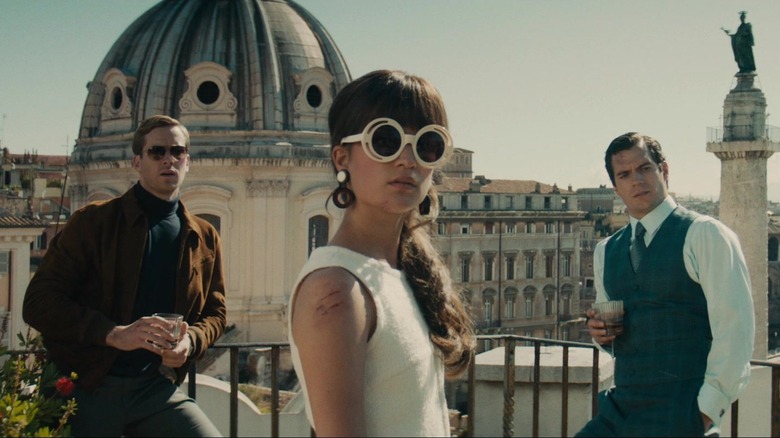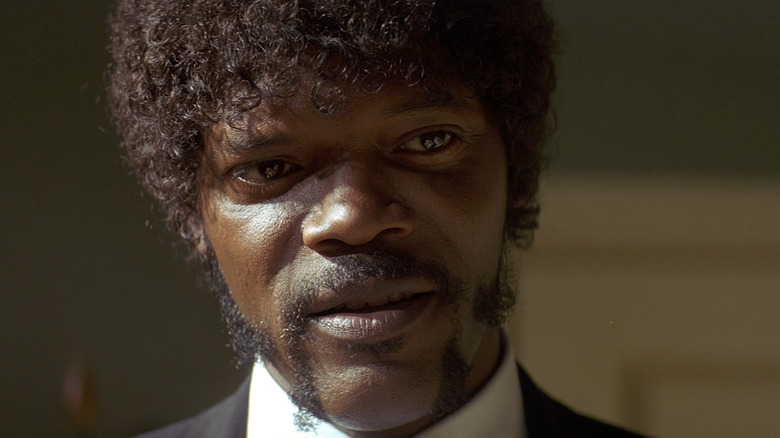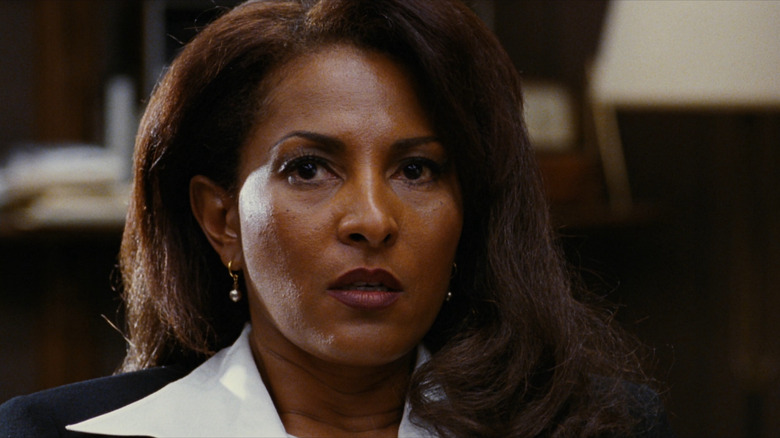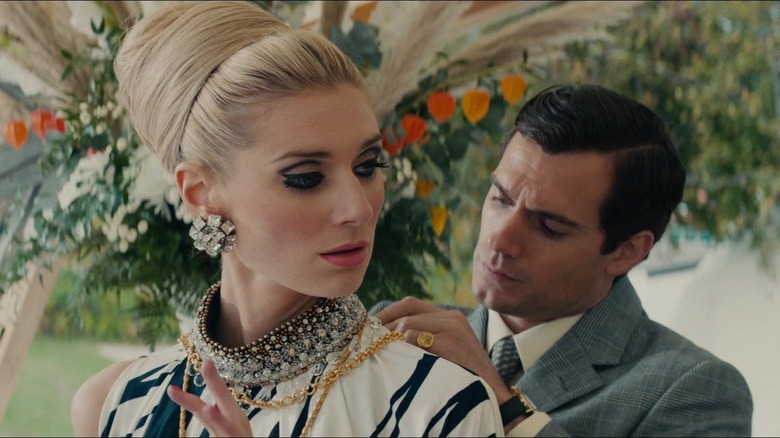Why Quentin Tarantino Never Made His Man From U.N.C.L.E. Movie
Whenever a director makes a well-regarded independent picture nowadays, the talk about what they do next almost immediately turns to Marvel. They are the commercial juggernaut of today's cinematic landscape, and when one of these filmmakers signs up for a Marvel project, half the people are excited to have more Marvel in their lives, while the other half bemoans that another talented voice will get lost within the corporate machinery. Jon Watts goes from making "Cop Car" to doing a trilogy of Spider-Man movies. Nia DaCosta makes the incredibly low-key drug thriller "Little Woods," and now she's taking on the forthcoming movie "The Marvels."
Marvel may be the most high profile of this pipeline, but this could be said about franchise filmmaking all over. Colin Trevorrow immediately goes from "Safety Not Guaranteed" to "Jurassic World." Jordan Vogt-Roberts goes from the small coming-of-age drama "The Kings of Summer" to a King Kong movie. Studios like looking to these breakout indie filmmakers and quickly getting them into their stable, enticing them with the opportunity to operate on a bigger scale with more time and money. The catch is that they will have to do that within the confines of the properties they already own.
While this is more prevalent now, it is nothing new. Before he became one of the very few American filmmakers whose name alone could get a movie made, Quentin Tarantino was nearly lured into the world of intellectual property driven, Hollywood moviemaking back in the 1990s, and one of the projects he considered making was an adaptation of the 1960s espionage show "The Man from U.N.C.L.E." Ultimately, it never came to pass, but the chance was very real that Tarantino would have taken the more conventional studio system path that so many directors can't turn down.
'I rise or fall by my ability'
Quentin Tarantino wasn't always a brand, back in the early 1990s, he was some guy who made a really exciting Sundance movie called "Reservoir Dogs." Anyone in Hollywood who sees that movie understands there was a lot of potential to be mined there, and they probably all expected him to go through the standard rise a director makes in the industry, going from small indie to slightly bigger budget to a full-on major production. So did Tarantino, and that's why doing something like "The Man from U.N.C.L.E." briefly made sense. Speaking with the Village Voice back in 2009, he said of his trajectory:
"I had flirted with the idea of a 'Man From U.N.C.L.E.' movie. But I grew out of the idea ... [I]f you made a film like 'Reservoir Dogs' for the studios, they'd say, 'That guy's pretty good. Maybe if we match him with more commercial subject matter, that will take it to the next step.' So I do my little art thing, 'Pulp Fiction,' in my little auteur way, and maybe it makes $30 to $35 million. 'OK, now we're ready to bring him into the studio system for real. Let's give him "Dick Tracy" or the "Man From U.N.C.L.E." movie,' something like that. Well, that didn't happen."
As it turned out, "Pulp Fiction" didn't make $30-35 million. It made over $100 million, became a genuine cultural phenomenon, and Tarantino was the poster boy of it. The notion of kowtowing to the studios was no longer a necessity. As Tarantino put it:
"I didn't have to wrap my voice in some commercial project to get it across. My voice, me being me, became huge, so I never had to do that. I rise or fall by my ability."
From 'U.N.C.L.E.' to Elmore Leonard
Instead of going ahead with "The Man from U.N.C.L.E." as his next project, Quentin Tarantino turned to the great crime novelist Elmore Leonard and chose to adapt the book "Rum Punch." He had the clout to do whatever he wished, and this little crime story about a middle-aged flight attendant called to him. In a play to make it even less obviously commercial, the title was changed from the book to "Jackie Brown," and he picked Pam Grier as its star, a woman who, quite frankly, had not been a majorly relevant name in nearly two decades.
While it wasn't the world-beating success that "Pulp Fiction" was, "Jackie Brown" still made nearly $75 million worldwide. On a $12 million budget, nobody is walking away from that result unhappy, and Quentin Tarantino firmly established that he was someone you could consistently rely on to put butts in seats. That experience also led Tarantino to realize that this creatively-driven path he was going down was the way he wanted his career to play out, saying to the Village Voice:
"[B]ack then, I was so gaga — 'I want to do this, I want to do that, da da da da.' After 'Jackie Brown,' I realized I'd gotten that kids' stuff out of my system."
The only time since that Tarantino has truly flirted with the idea of attaching himself to a franchise was his recent "Star Trek" project that doesn't seem to be happening anymore. But I never thought that would ever happen. Tarantino, James Cameron, and Christopher Nolan are basically the only three filmmakers with full autonomy in Hollywood nowadays, and considering Tarantino claims he only will direct one more film, it probably isn't going to be some random franchise.
Eventually picked up by Guy Ritchie
The dream of making a "The Man from U.N.C.L.E." movie did not die with Quentin Tarantino. It took about 20 more years, but an adaptation of the series finally hit the big screen in 2015 directed by Guy Ritchie. Similar to Quentin Tarantino, he was someone who emerged in the 1990s with his own in-your-face, stylish crime movies, and it was thought he would probably have a similar career to the "Pulp Fiction" director. However, Ritchie's fortunes with the box office never reached as high and quickly turned sour, with movies like "Swept Away" and "Revolver" tanking financially.
After making the back-to-basics crime film "RocknRolla" to get back in people's good graces, Ritchie did what Tarantino didn't and fully embraced the Hollywood moviemaking machine, directing two "Sherlock Holmes" movies, a King Arthur flick, the live-action "Aladdin" remake (with "Hercules" on the way), and "The Man from U.N.C.L.E." Guy Ritchie needed to do all of this franchise and IP management material in order to be able to make a film like "Wrath of Man."
I actually think "The Man from U.N.C.L.E." is Guy Ritchie's best film. He tones back his trademark vulgarity without losing his zippy style and makes one of the most fun and underrated studio pictures of the last decade. While a Quentin Tarantino helmed "The Man from U.N.C.L.E." would have been interesting, I'm glad that the timeline shook out this way. I needed Guy Ritchie to show me something from him that I hadn't seen before, and he absolutely delivered.
Ironically, "The Man from U.N.C.L.E." ended up being a major box office disappointment, making $45 million domestically (which isn't much more than "Jackie Brown" did nearly 20 years earlier). Shows you that not every property is seen as equal in the eyes of the public.



